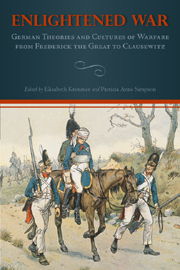Book contents
Introduction: Enlightened Warfare in Eighteenth-Century Germany
Published online by Cambridge University Press: 05 February 2013
Summary
IN 1942, ERICH WENIGER, a renowned professor of pedagogy, published a book entitled Goethe und die Generäle (Goethe and the Generals). Weniger was concerned with a perceived rift between what he called the cultures of Potsdam and Weimar, that is, the ethos of German militarism and the culture of Weimar Classicism. The personification of this antithesis was the most prominent exponent of Weimar Johann Wolfgang von Goethe, whom Weniger accused of a decidedly anti-military attitude and temperament, citing
Goethes oft und deutlich geäusserte Abneigung gegen Preussen, seine niemals verhehlte Bewunderung für Napoleon, das befremdende Schweigen der Tag- und Jahreshefte über die doch recht nahe liegenden Ereignisse des Oktobers 1806, die Flucht nach Teplitz 1813, die kühle Zurückhaltung gegenüber dem Freiheitswillen der jüngeren Generation, das Fernhalten des Sohnes vom Dienst in der Front.
[Goethe's often and explicitly stated aversion to Prussia, his neverconcealed admiration for Napoleon, the alienating silence in his dayand yearbooks about the events of October 1806 that occurred very near him, his escape to Teplitz in 1813, his cool aloofness towards the passion for freedom of the younger generation, keeping his son from serving on the front.]
To Weniger, Goethe's presumed distance from a culture of war was a source of deep pain: “für uns [liegt] das Schmerzliche darin […], dass Weimar sich in geschichtlich bedeutsamer Stunde gegen Potsdam gewendet haben könnte” (6; for us the pain consists in the fact that Weimar could have turned against Potsdam in a historically significant hour).
- Type
- Chapter
- Information
- Enlightened WarGerman Theories and Cultures of Warfare from Frederick the Great to Clausewitz, pp. 1 - 18Publisher: Boydell & BrewerPrint publication year: 2011

